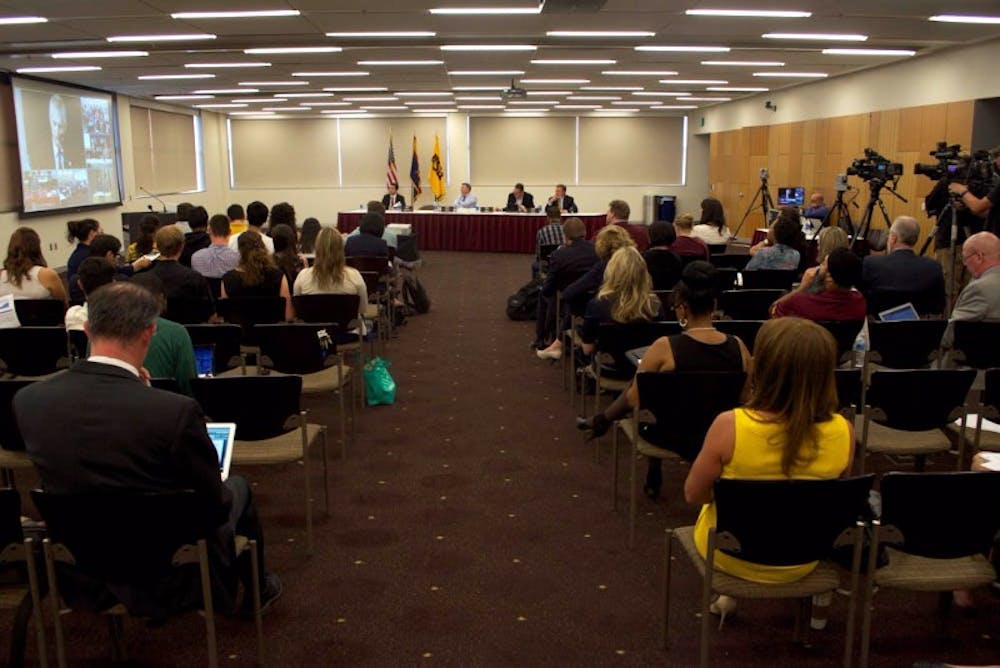The Arizona Board of Regents concluded the final day of its summer session Friday by packing in a host of items up for approval and funding new research for the next five years.
Perhaps the most notable issues addressed in the session's last meeting were the Technology and Research Initiative Fund (TRIF) investments, an artifact of Arizona Proposition 301, which increased sales tax to fund various educational initiatives statewide.
TRIF investments are designed to maximize returns on investment for the Arizona taxpayer by funding research that grows the Arizona economy and betters the lives of state residents.
The Regents Friday voted to approve the final five year TRIF funding cycle for each university.
"Citizens of Arizona ignited a tremendous effort within the universities to grow research (by passing Prop. 301)," said Regent Rick Myers. "I think Prop. 301 is the most important economic development initiative the state has taken in the last two decades. ASU, back when TRIF was passed, was doing under $100 million in research. Now, it's doing $500 million."
.@AZRegents: TRIF Regents Innovation Fund projects going toward #AZ transportation projects; cyber security; research infrastructure.
— AZ Board of Regents (@AZRegents) June 10, 2016
Arizona State University proposed to focus its funding into five initiatives: improving health, national security systems; water, environmental and energy solutions, access and workforce development in relation to entrepreneurship and innovation and access and workforce development in relation to advanced manufacturing.
Like the state's other public universities, ASU focused the plurality of its proposed TRIF funding toward improving health — $74 million over five years.
ASU, said Chief Research and Innovation Officer Sethuraman “Panch” Panchanathan, was mainly investing its health improvement money toward the Biodesign Institute.
"If you look at nationally, more than half of the biomedicine research expenditures are in the area of biomedicine," he said. "So no wonder we should be competing in this area."
Panchanathan said TRIF funding is necessary for sustaining the innovation and achievement for which ASU has become known.
"TRIF has taken us as a University from a research-active University to a research-productive University," he said. "Now, we are going to become a hyper-productive University. (TRIF) is going to take Arizona to the global stage."
The Regents also approved a series of consent agenda action items, which were discussed previously in private and could be approved in bulk on Friday.
These items included an extension to ASU's lease of office and academic space at the Arizona Center in downtown Phoenix, approval to finance the renovations to Sun Devil Stadium and Gamma Auditorium and the approval of the intergovernmental agreement between ASU and the city of Mesa, further paving the way for an ASU presence in the city's downtown area.
In the consent agenda, the Board also approved one-year extensions to the contracts of ASU head football coach Michael Todd Graham and head men's basketball coach Robert Hurley. The Regents also approved a two-year extension to the contract of head women's basketball coach Charli Turner Thorne.
Friday's meeting was also characterized by a cautious optimism about the state's educational future — especially in light of massive budget cuts and rising tuition, a shared passion for higher education unified those in attendance.
Jackson Dangremond, the undergraduate student government president of ASU's downtown Phoenix campus, spoke at the beginning of the meeting to highlight his positive feelings for the Board, despite concerns that had been previously raised that the University was not cooperating in increasing financial aid, as USG had requested.
"During these last three days, I have spent some time reflecting on my experience at ABOR," he said. "My first experience took place last year, in Tucson, when the universities were facing the reality of being cut by $99 million. I tell you this because, throughout these meetings, I have noticed a change in dialogue — a tone in the dialogue that is more optimistic and reverent, which I attribute to the reinvestment in higher education by the state. The reinvestment may have not occurred without the collaboration of the three universities and the Arizona Board of Regents."
Reach the reporter at Arren.Kimbel-Sannit@asu.edu or follow @akimbelsannit on Twitter.
Like The State Press on Facebook and follow @statepress on Twitter.




